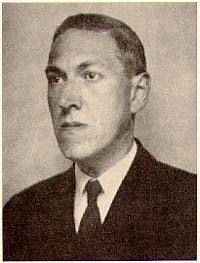H.P. Lovecraft (1890-1937), an American writer of
pulp fiction, is loved by some adepts of the fantastic story. His
stories assume a self-developed Cthulhu-mythology: "All my
stories assume the fundamental knowledge or legend that this
world once was inhabited by another race, that lost its support
by practicing black art, yet lives on elsewhere, perpetually
prepared to take over the earth once again" (Wordt Vervolgd
I).
The stories of Lovecraft are full of the threat of the
Unnamable, the Terrible. They are full of damned, occult
knowledge, cursed books and the insanity of those that once have
been in contact with what is to remain asleep, forever hidden.
Lovecraft has written succesful stories, like 'the Shadow over
Insmouth', 'The haunter of the dark',
'The outsider' and 'The thing on the doorstep'.
In the Netherlands, several bundles
have been published, mainly by Bruna. Lovecrafts horror is not
subtle, and many of his stories are boring and grotesque, but he
has inspired many people, amongst whom Philippe Druillet and
Alberto Breccía, who have each in their own way tried to express
the Unimaginable.

H.P. Lovecraft
